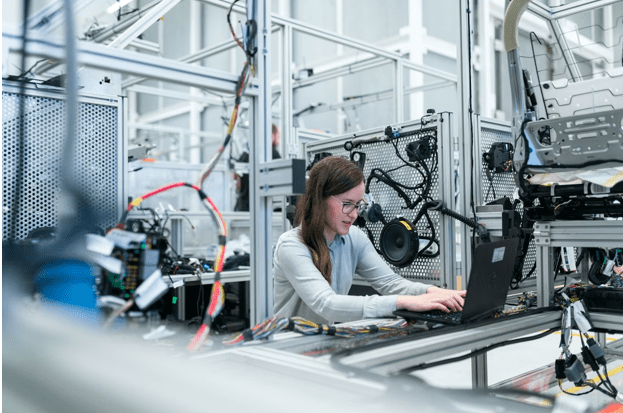Technology shapes how organizations function, collaborate, and deliver results. Modern workplaces depend on tools that streamline processes, enhance communication, and support employee satisfaction. From digital workflows to data-driven decision-making, innovation touches every aspect of daily operations. These changes affect how teams interact, how resources are managed, and how businesses prepare for future challenges.
Digital Tools Reshape Daily Operations
The shift toward digital platforms transforms how tasks are organized and executed. Cloud-based project management tools give teams shared spaces where they plan, track, and deliver work. Real-time updates reduce communication gaps and keep everyone aligned. Digital calendars, file-sharing systems, and scheduling software eliminate bottlenecks caused by outdated manual methods.
Automation plays a major role in reducing repetitive work. Tools that handle data entry, reporting, and routine communication allow employees to focus on strategy and problem-solving. These systems increase efficiency and minimize human error, leading to more consistent outcomes across departments.
Smarter Workspaces Increase Efficiency
Office design adapts to incorporate technology that supports flexible, efficient use of space. Companies integrate smart locker solutions for offices to improve storage access and reduce administrative overhead. These systems use secure digital access, allowing employees to pick up deliveries, store equipment, or share resources without relying on reception staff. Integrating smart infrastructure with digital ID systems creates seamless workflows that match the pace of modern operations.
Workplaces incorporate sensors that monitor occupancy levels, air quality, and temperature. Facilities teams use this data to optimize space usage and energy consumption, improving both comfort and sustainability. Intelligent building systems help companies balance operational costs with employee well-being.
Remote Collaboration Expands Global Reach
Technology eliminates geographical barriers, allowing companies to build distributed teams across cities and countries. High-quality video conferencing tools, virtual whiteboards, and shared digital workspaces create collaborative environments where teams operate in real time. Employees contribute ideas, share updates, and execute projects without needing to gather in the same location.
This connectivity enables companies to access global talent pools, bringing diverse perspectives into their workflows. It strengthens organizational resilience by reducing reliance on a single geographic location. Remote work platforms support flexibility, which many professionals value as a core part of modern employment.
Data Analytics Drives Strategic Decisions
Businesses rely on data to shape their strategies with greater accuracy. Advanced analytics platforms collect and process information from multiple sources, including sales, customer interactions, and internal performance metrics. Decision-makers use this data to identify trends, assess risks, and target opportunities with precision.
Machine learning algorithms enhance this process further by detecting patterns that human analysis might overlook. Predictive modeling supports proactive planning, helping companies stay ahead of shifting market conditions. Data-informed decisions create measurable advantages, whether through operational improvements or customer engagement strategies.
Employee Experience Improves Through Personalization
Personalized digital platforms help employees navigate their roles with clarity and autonomy. Intranets and self-service HR portals give workers quick access to benefits, payroll, and scheduling information without needing to wait for administrative assistance. Customizable dashboards let individuals track performance goals and project contributions.
Learning management systems provide tailored development opportunities. Employees access courses, certifications, and mentorship programs that align with their career aspirations. Personalized support increases engagement and helps retain top talent in competitive industries.
Security Innovations Protect Modern Workflows
As companies rely more heavily on digital systems, security becomes a central priority. Multifactor authentication, encrypted communications, and zero-trust frameworks safeguard sensitive information. Endpoint security solutions protect remote devices, ensuring that distributed teams maintain compliance with organizational policies.
Artificial intelligence plays a growing role in detecting and responding to security threats. Real-time monitoring systems flag unusual behavior before it escalates, minimizing potential breaches. Strong cybersecurity practices build trust with clients and employees alike, reinforcing the stability of digital operations.
Sustainability Gains From Tech Integration
Technological innovation supports environmentally conscious workplace strategies. Energy-efficient systems reduce power consumption while maintaining optimal conditions for employees. Automated lighting and HVAC controls respond to occupancy patterns, cutting waste without compromising comfort.
Digital documentation reduces paper use significantly. Virtual collaboration replaces travel-heavy meetings, shrinking organizational carbon footprints. Sustainable operations align with regulatory requirements and appeal to environmentally aware clients and employees.
Preparing for the Future Workplace
Workplace technology continues to evolve, with artificial intelligence, augmented reality, and advanced robotics on the horizon. These developments promise deeper automation, immersive collaboration, and faster data processing. Organizations that remain adaptable will benefit from early adoption of emerging tools that reshape daily operations and long-term strategies.
Investing in adaptable infrastructure ensures smooth integration of future technologies. Companies that prioritize employee training keep their workforces ready to leverage new tools effectively. Forward-thinking strategies combine technological capability with human creativity to shape resilient workplaces.
Technology revolutionizes how businesses function, communicate, and plan for growth. Digital tools enhance operations, smart workspaces improve resource use, and remote collaboration opens global opportunities. Data analytics drives informed strategies, while security innovations safeguard assets. Personalization and sustainability further strengthen modern workplaces. As new technologies emerge, organizations that embrace change create agile, efficient, and competitive environments that thrive in an ever-evolving professional landscape.
Read More From Techbullion




























